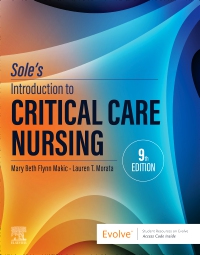
Sole’s Introduction to Critical Care Nursing, 9th Edition
Paperback

**Selected for 2025 Doody’s Core Titles® in Critical Care**
Help your students develop the knowledge and skills needed for success in critical and progressive care nursing! Sole’s Introduction to Critical Care Nursing, 9th Edition is a concise, easy-to-understand guide to safe, effective, and person-centered critical and progressive care nursing. Its evidence-based approach includes realistic case studies and unpacks the concepts, technologies, and skills used in caring for acutely and critically ill patients. Disorders are conveniently organized by body system or special situation. Content has been updated throughout, including new content on COVID-19, expanded tools for the Next-Generation NCLEX® (NGN) Exam and clinical judgment, new integration of the 2021 AACN Essentials including a new emphasis on nursing self-care and health equity, and new quick-reference Key Points at the end of each chapter. Designed for one-semester courses, this concise textbook prepares students for success on the NGN and in their roles as critical or progressive care nurses.
-
- NEW! Content on the implications of the global COVID-19 pandemic for critical care nursing includes new content on proning as a standard critical care procedure and expanded coverage of nursing self-care — including new Nursing Self-Care boxes, consistent with the 2021 Future of Nursing report.
- NEW! Expanded tools for the Next-Generation NCLEX® (NGN) Exam includes more coverage of the six cognitive skills of NCSBN’s Clinical Judgment Measurement Model, with new use of the cognitive skills along with nursing process terminology, expanded use of clinical judgment terminology, and expanded, newly interactive NGN-style case studies on the Evolve website.
- NEW! Updated content throughout reflects the latest evidence-based developments as well as national and international guidelines.
- NEW! Integration of the 2021 AACN Essentials features special emphasis on Clinical Judgment and Diversity, Equity, and Inclusion, including the use of non-gendered language and illustrations with enhanced diversity.
- NEW! Key Points bulleted lists at the end of each chapter reinforce the chapter’s most important content.
- Optimal balance of depth and breadth of critical care nursing content is perfect for students and practicing nurses preparing for critical and progressive care settings, and for CCRN® or PCCN® certification.
- Evidence-based, need-to-know content covers the concepts, technology, and procedures of critical and progressive care nursing, with an emphasis on patient safety and person-centered care throughout.
- Disorders commonly seen in critical and progressive care settings are conveniently organized by body system or special situation, and nursing management chapters include quick-reference nursing care plans.
- Abundant learning aids include true-to-life illustrations, integrated clinical judgment activities, case studies with additional clinical judgment questions, in-text self-check questions, a Universal Collaborative Plan of Care for the Critically Ill Patient, and more
- Evidence-Based Practice boxes demonstrate the connection between theory and practice for specific topics, with each box including a problem, its related clinical question and evidence, and implications for nursing.
- Critical Judgment Activities are included throughout the text, promoting development of clinical nursing judgment to help students prepare for the NGN and for clinical practice.
- Clinical Alerts highlight concerns, significance, and procedures to help students understand potential problems in critical and progressive care settings.
- Hundreds of full-color photographs and drawings clarify key concepts and demonstrate equipment in the critical care environment to help acclimate students to the technology of critical and progressive care nursing.
- Robust Evolve website for students and faculty includes two collections of NGN-style case studies (one for faculty and one for students), application-level questions for students, and much more.
-
- NEW! Content on the implications of the global COVID-19 pandemic for critical care nursing includes new content on proning as a standard critical care procedure and expanded coverage of nursing self-care — including new Nursing Self-Care boxes, consistent with the 2021 Future of Nursing report.
- NEW! Expanded tools for the Next-Generation NCLEX® (NGN) Exam includes more coverage of the six cognitive skills of NCSBN’s Clinical Judgment Measurement Model, with new use of the cognitive skills along with nursing process terminology, expanded use of clinical judgment terminology, and expanded, newly interactive NGN-style case studies on the Evolve website.
- NEW! Updated content reflects the latest evidence-based developments as well as national and international guidelines.
- NEW! Integration of the 2021 AACN Essentials features special emphasis on Clinical Judgment and Diversity, Equity, and Inclusion, including the use of non-gendered language and illustrations with enhanced diversity.
- NEW! Key Points bulleted lists reinforce the most important content in each chapter.
-
PART I Fundamental Concepts
1 Overview of Critical Care Nursing
2 Patient and Family Response to the Critical Care Experience
3 Ethical and Legal Issues in Critical Care Nursing
4 Palliative and End-of-Life Care
5 Organ Donation
6 Comfort and Sedation
PART II Tools for the Critical Care Nurse
7 Nutritional Therapy
8 Dysrhythmia Interpretation and Management
9 Hemodynamic Monitoring
10 Ventilatory Assistance
11 Rapid Response Teams and Code Management
PART III Nursing Care During Critical Illness
12 Shock, Sepsis, and Multiple Organ Dysfunction Syndrome
13 Cardiovascular Alterations
14 Nervous System Alterations
15 Acute Respiratory Failure
16 Acute Kidney Injury
17 Hematological and Immune Disorders
18 Gastrointestinal Alterations
19 Endocrine Alterations
20 Trauma and Surgical Management
21 Burns
Answer Key
Index



 as described in our
as described in our 